Latin America and the Caribbean: JICA Working with Startups to Address Social Challenges

2024.02.08
Latin America and the Caribbean lie on the other side of the globe from Japan. Home to approximately 650 million people, the region is one of the world’s biggest food producing areas and has experienced rapid economic growth in recent years. At the same time, it confronts a number of major challenges, including deforestation, social inequality, and high rates of crime.
Helping address many of these issues are Japanese startups that are participating in a program called TSUBASA, supported by JICA and IDB Lab. Why is JICA engaged in promoting innovation among startups? And why Latin America and the Caribbean? In the following, JICA Senior Vice President Miyazaki and entrepreneurs participating in TSUBASA describe the region’s potential and the benefits the program offers.
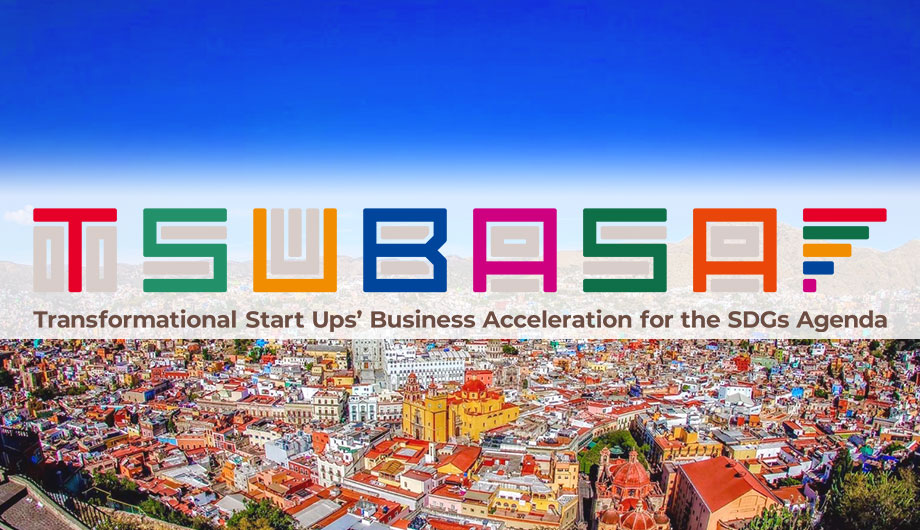
TSUBASA (meaning “wing” in Japanese) stands for Transformational Start Ups’ Business Acceleration for the SDGs Agenda. It was launched in 2021 to support Japanese startups engaged in helping mitigate development challenges in Latin America and the Caribbean. The program brings together these startups’ innovative technologies and ideas; JICA’s expertise in developing country assistance; and the financing, knowledge, and connections of IDB Lab* of the Inter-American Development Bank Group—the region’s biggest international development bank.
“The GDPs of countries in Latin America and the Caribbean are relatively high compared to those of countries in other regions,” notes JICA Senior Vice President Miyazaki Katsura, “and the support they look for from Japan has been rising in level of difficulty.”
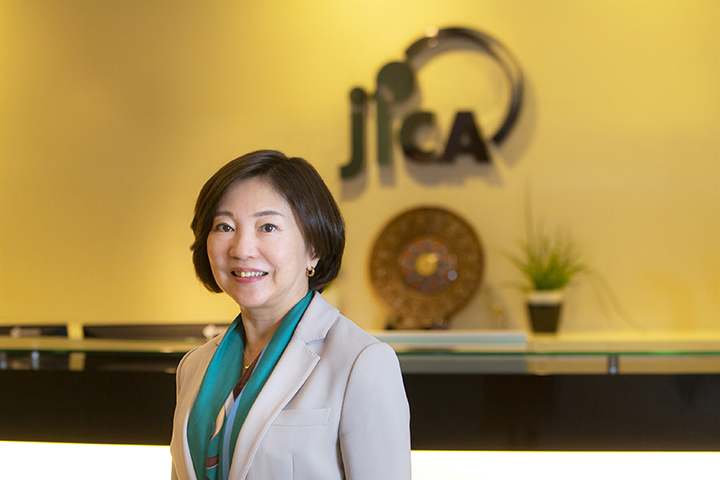
Senior Vice President Miyazaki Katsura joined JICA after studying the Spanish language and Hispanic studies at university and was assigned to the Argentina office. She has been Senior Vice President since October 2022 responsible for a broad range of operations, including in the Latin America and Caribbean region.
While Latin America as a whole enjoys high income levels, it also plays a critical role in global issues like climate change and food security, since it is home to the Amazon rainforest and is a major producer of agricultural commodities. JICA has been working to address these issues through various ODA schemes and in partnership with the private sector. New needs have emerged, though, as development issues have become more complex and sophisticated. This is why JICA has turned its attention to startups.
“We believe that with their innovative business models and technologies, startups can provide services that hadn’t existed before,” Miyazaki notes. “And by collaborating with these companies, we hope to be able to address the increasingly complex issues faced by partner countries more quickly and achieve much greater development impact.”
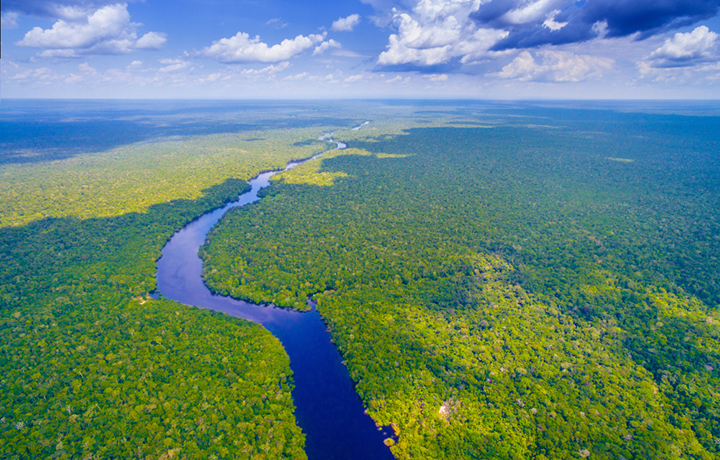
The conservation of the Amazon rainforest, often referred to as the “lungs of the planet,” holds global significance in tackling climate change. (Photo: Shutterstock/Worldclassphoto)
The number of Japanese companies operating in Latin America is relatively small, since the region is so far away, being located on the other side of the globe. But Nakayama Mitsuru, a venture capitalist active in Latin America and founder of B Venture Capital—a TSUBASA partner—is one Japanese businessman who sees great potential in this part of the world.
The 33 countries of Latin America and Caribbean have a combined population of some 650 million and nominal GDP of about US$5.8 trillion. Compared to ASEAN, the population is roughly the same, but GDP is 1.6 times higher. Brazil and Mexico are now experiencing demographic dividends, and some projections see these countries surpassing Japan’s GDP by 2050. “In the short to medium term, the region is one of the few emerging markets where economic growth and development issues coexist,” Nakayama says. And because the region faces many of the same social challenges as Japan—urbanization, population aging, and disaster prevention—there are also growing opportunities for Japanese companies to utilize their know-how and services.
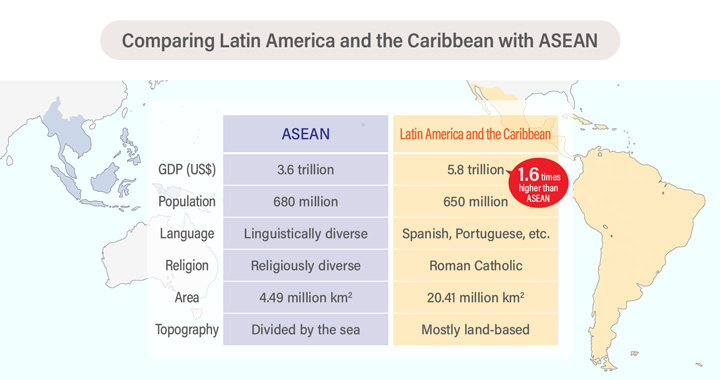
Sources: GDP from the International Monetary Fund’s World Economic Outlook database (2022), Population from World Bank Open Data (2022), and area from the Japanese Ministry of Foreign Affairs website.
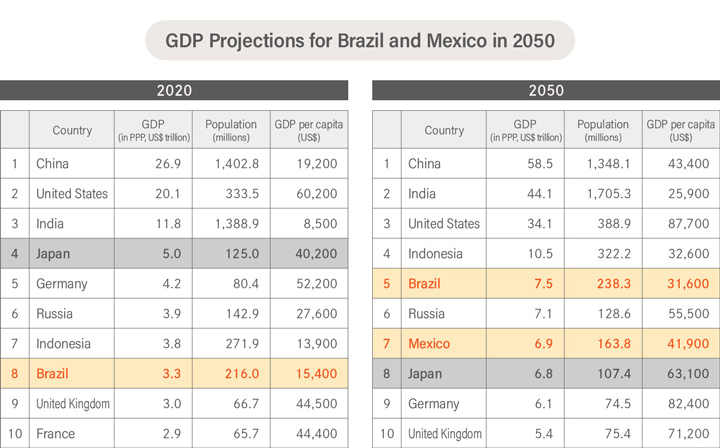
Source: PwC, The World in 2050 (GDP in purchasing power parity terms)
https://www.pwc.com/gx/en/research-insights/economy/the-world-in-2050.html
In recent years, Brazil, Mexico, and Colombia have led the way in building an ecosystem to support the growth of startups. The region’s investments in startups totaled an equivalent of some 2 trillion yen (about US$13.5 billion) in 2021. Brazil alone accounts for approximately 1 trillion yen (about US$6.75 billion), a figure exceeding Japan. As a result, many unicorns have emerged. The region’s shared cultural foundation in terms of language, religion, and other factors makes it easier for successful businesses to expand into neighboring countries. And this makes the region conducive to rapid business expansion.
One appeal of the TSUBASA program is the presence of the Nikkei community—the estimated 2.4 million people of Japanese descent—in Latin America. “The trust that this community has built up over the years in the region is a tremendous value that does not exist in ASEAN or Africa,” notes JICA’s Miyazaki. “JICA has built strong networks with Nikkei communities in many countries of the region through its longstanding support for Japanese emigrants and their descendants. TSUBASA is an excellent means by which Japanese startups can connect with these communities.”
Startups selected to join the TSUBASA program receive approximately six months of full support to accelerate the development of their business in the region. This includes opportunities to connect with local partners from among the many organizations in the JICA and IDB Lab networks, as well as mentoring in business practices and development impact. Businesses with high potential may receive additional support from IDB Lab following the six-month period. To date, 8 companies (out of 23 applicants) were selected for the program in 2021, and 11 more (out of 29 applicants) in 2022. Each of the selected firms have gained a foothold in the Latin American market.
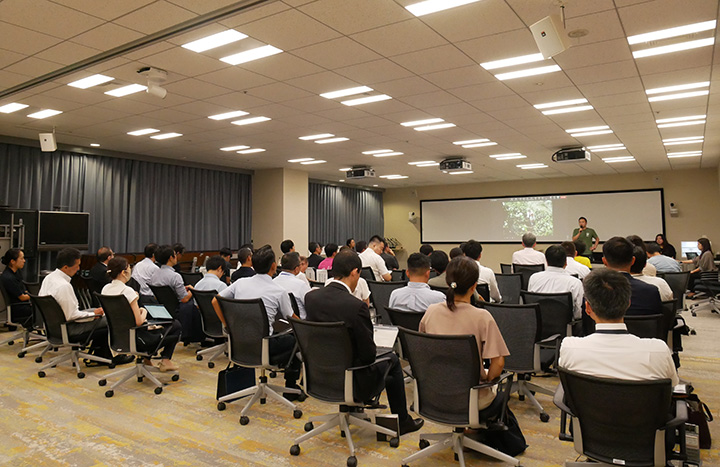
There were 31 in-person participants at the TSUBASA kick-off event in September 2023. A lively Q&A session was held on the local business environment for startups and other topics.
One such company is sustainacraft, which promotes decarbonization investments by accurately assessing the effectiveness of nature conservation projects. “Enhancing forest carbon stocks is essential to addressing climate change, but deforestation is increasing, particularly in Latin America,” explains Suetsugu Hiroshi, the company’s CEO. “This is because converting forests to agricultural and livestock land provides better income for inhabitants. Brazil alone is estimated to be losing about a million hectares of forests each year.”
One source of funding for forest conservation and restoration projects is carbon credits. These are generated by forest conservation activities that reduce greenhouse gas emissions and that can be traded to businesses wishing to purchase credits as a means of achieving decarbonization. Problems have been pointed out, though, on the lack of transparency in just how effective such projects have been in absorbing and reducing greenhouse gases. The solution developed by sustainacraft is to use satellite-based remote sensing and causal inference techniques to accurately ascertain what is happening on the conservation project site and ensure the sound functioning of the carbon credit market.
Suetsugu applied to TSUBASA just a few months after launching his business. He knew that he needed to engage with the Latin American market, which has many forested areas, but he had no local network at the time. “In a word, TSUBASA was simply amazing,” he notes. “In a very short period of time, we were introduced to so many institutions and conservation NGOs. As a result, we were able to locate a local partner. We’ve been chosen to receive additional support from IDB Lab, and we hope to continue to promote sound climate financing mechanisms for natural capital in Latin America.”
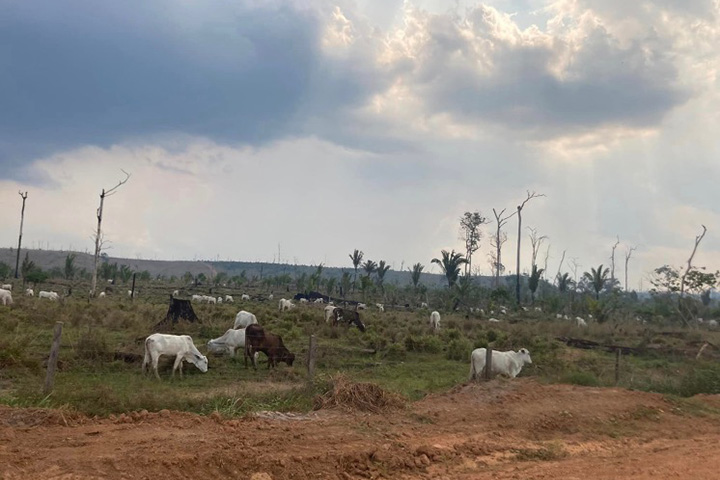
More and more forests in Brazil are being cleared and converted to livestock and agricultural land.
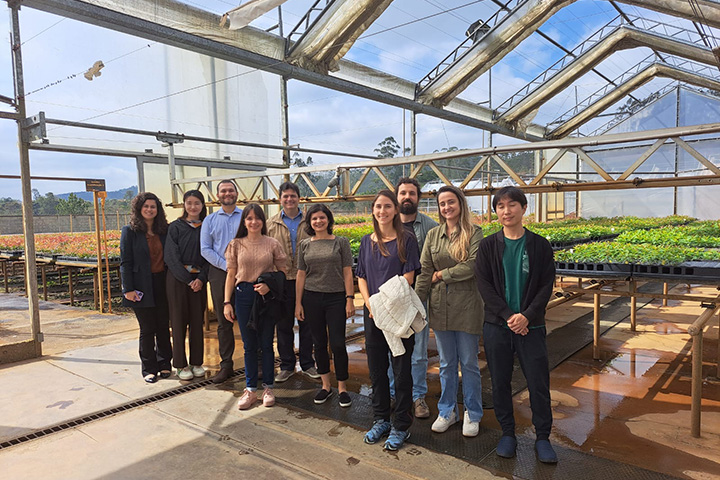
Sustainacraft CEO Suetsugu, far right, with members of a local afforestation project.
Another startup participating in the TSUBASA program is Singular Perturbations, which develops crime prediction systems using proprietary algorithms with the goal of “reducing the sad experiences of the world.” The company entered the Latin American market after joining TSUBASA in 2021.
One major challenge facing Latin America and the Caribbean is the high rate of crime. Some surveys show that around half of the 20 most dangerous cities in the world are in Latin America. Improving public safety and preventing crime are therefore key concerns for many people in the community, not just police departments and security companies but also such sectors as insurance, travel, and real estate. Singular Perturbations hopes to meet the region’s growing security and crime prevention needs through Crime Nabi, an application that optimizes security and patrol routes using a unique crime prediction system. Thanks to TSUBASA, it is working with a Uruguayan startup to meet local needs.
“Generally speaking, a foreign startup will initially have a very hard time establishing a cooperative relationship with police departments and government agencies,” says the company’s CEO Kajita Mami. “Going through TSUBASA made setting up appointments easier, and we also received interpretation help when English wasn’t spoken. This allowed us to interview many local officials and to learn about their needs.
“Thanks to consulting support on who would be the right partner for us in conducting field tests and achieving commercialization,” Kajita continues, “we were able to identify a local partner for B2B business development.” As a consequence, the company was able to conduct a field test in Brazil on cable theft, which resulted in a 69% reduction in the number of crimes and led to the establishment of a branch office in São Paulo in October 2023.
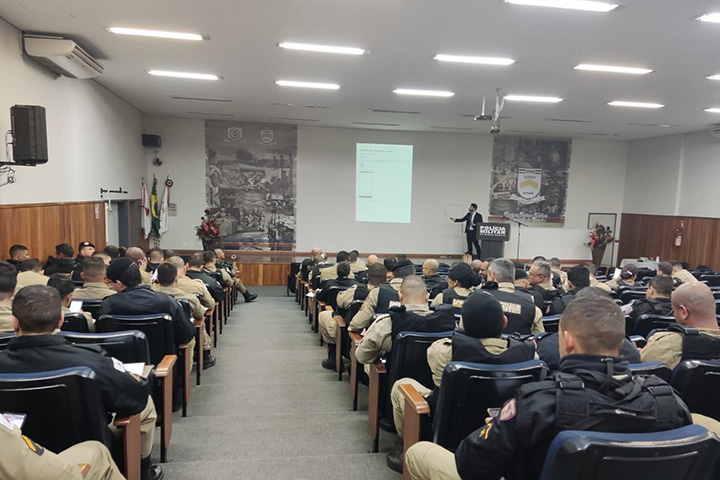
Field tests were conducted in collaboration with the municipal police force of Belo Horizonte in the state of Minas Gerais, Brazil.
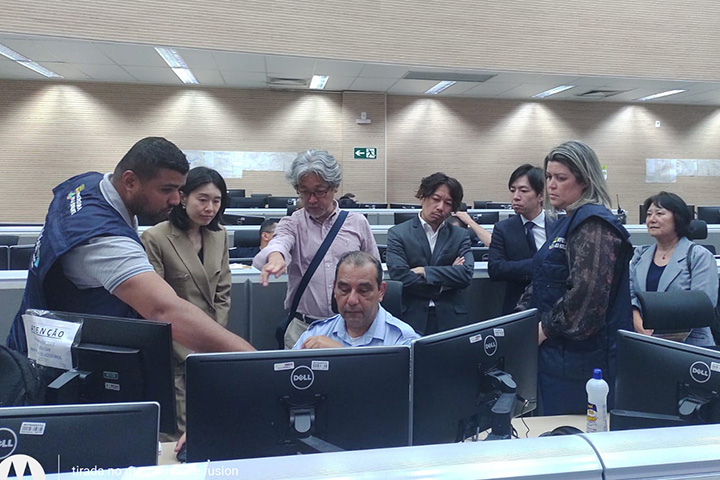
Kajita, second from left, in a discussion on the use of surveillance cameras for crime prediction.
“The countries of Latin America and the Caribbean have long recognized a diversity of cultures in their nation-building efforts,” points out JICA’s Miyazaki. “And the same mindset can also be seen in the business sector. There is an openness to new technologies and products from abroad. Given the region’s great potential and the relatively low presence of Japanese companies, this market can be regarded as a ‘blue ocean’ for companies looking to develop new businesses. There’s room for many more companies to become active in the region, so I hope they’ll apply to TSUBASA and take advantage of the opportunities offered by the program.”
TSUBASA represents a new form of development cooperation for JICA that is taking flight in Latin America and the Caribbean.
scroll